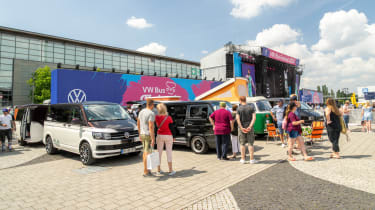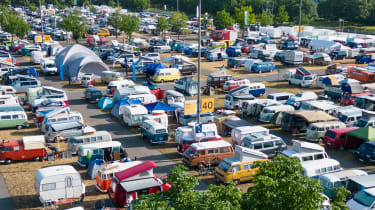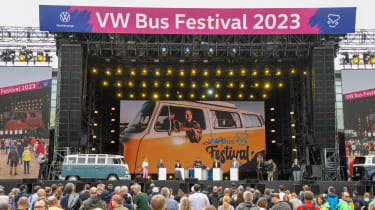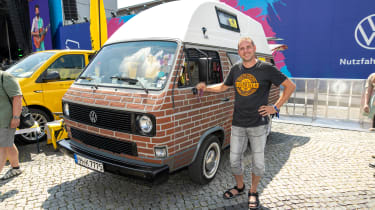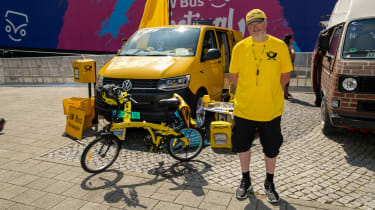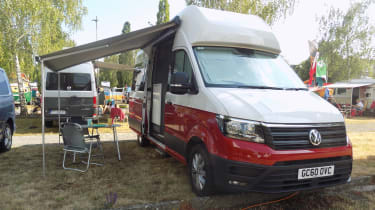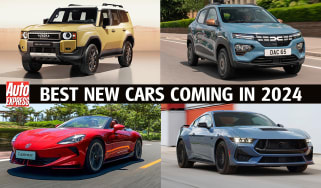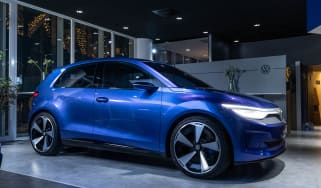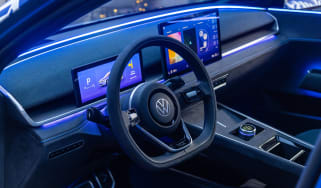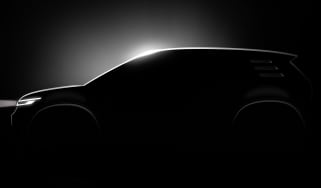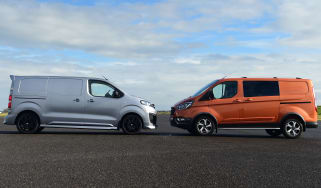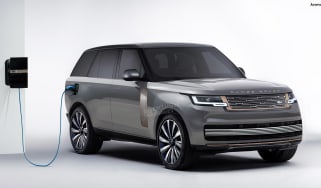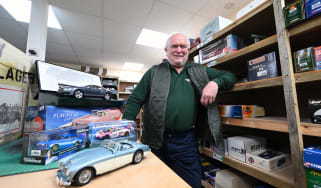Why does everyone love VW campervans?
We join 80,000 Volkswagen bus fans in Germany for a festival to mark 75 years of the brand’s iconic vehicles
There are lots of hugely popular classic car shows in the world, but for one single model to attract around 80,000 people from all over Europe to a single event is a pretty big deal, especially when said model is a van.
It’s been more than 75 years since the iconic Volkswagen Type 2 was first designed, and to celebrate this milestone, the brand organised a full-scale festival in the van’s hometown of Hanover, Germany. And when we say a festival, we mean an event complete with live bands, massive crowds and rows of portable toilets.
This celebration isn’t just for Type 2 fans, though, because more than 6,000 VW campervans and buses of all generations travel from far and wide to pitch up at the festival campsite. It’s a full selection ranging from the T1 right through to the contemporary all-electric ID. Buzz.
Our own van for this trip to northern Germany is a Grand California, which is by far the largest and priciest camper in the current VW line-up. It’s certainly plush by campervan standards, too, thanks to its on-board wetroom and satellite dish. Regardless of this, though, many of our fellow campers are quick to come by and say hello, admire the Grand California and share their stories with us.
Plenty of non-van owners have also made the trek to celebrate the ‘Bulli’s’ anniversary and show their love for the vehicle. The fact is that no matter what the generation of van, age of the person or even the language they speak, the sense of community and passion from this plethora of enthusiasts is incredibly strong.
So what is it about this particular line of vans that people seem to love so much? There certainly weren’t tens of thousands of guests at the Ford Transit or Mercedes Sprinter’s last birthday celebrations, so what makes the Volkswagen so special in the eyes of so many?
“It’s a legacy,” explains Christian Buhlmann, the head of product communications at Volkswagen Commercial Vehicles. “The Type 2 was created at the end of the forties, and it offered far more versatility than any other vehicle. This was a bodystyle that allowed multiple functions and a wide range of seating, bedding and kitchen arrangements, and it quickly became very popular.”
So how has this legacy lasted so long? According to Christian: “The van is a keeper, and many examples have been passed down through generations. Over the years, more and more people have also wanted to join in this experience. They want to be able to go anywhere at any time in a vehicle that can just as easily serve as an everyday car.”
This spirit of adventure and freedom is indeed prominent when it comes to the festival’s four-wheeled attendees, with many of the vans being either factory-built campers or carefully-crafted conversions. But the most surprising thing is that almost every single one is unique in some way.
The very best examples of the clean and the quirky are the official ‘Show’n’Shine’ contenders. There are plenty of purists with immaculately restored originals, along with fans of the good old flower-power era of the late sixties, but some of the creations on show here are truly mind-boggling. After all, when was the last time you saw a van made of bricks?

Patrick Steffens, the proud owner and creator of ‘Number 5’, tells me that he actually lives in his van for three days every week due to his work as a mobile recovery truck driver. “I’ve built myself an actual house on wheels,” Patrick explains. “This is an ex-police crew cab bus that I bought online 12 years ago. It was riddled with mechanical and bodywork issues when I first picked it up, so when I got to work on the restoration, I also started converting it into a one-of-a-kind camper. It now has toilet and washing facilities, kitchen equipment and water tanks, along with traditional wood and stone panelling”.
It certainly looked cosy, but what about the bricks? “They are made from a special rubber that I had imported from Holland, and I did all the measuring, cutting and fitting myself. The whole process took me three months,” he says.
While there’s no questioning Patrick’s commitment to creating his home from home, after completing their deliberations, the ‘Show’n’Shine’ judges decide that the winner is a van at the other end of the eccentricity scale.
If you spotted Rune Andersen’s T6 Transporter on any street in Germany, you’d be forgiven for thinking that it’s just part of the fleet used by Deutsche Post — the German postal service. Take a second glance, though, and you’ll notice an anomaly: it’s on Norwegian number plates.
This is actually a faithful replica created by Rune, and it’s just one part of his vast collection of Deutsche Post memorabilia, much of which he has displayed in and around the van. He opens the sliding door to reveal that his T6 Transporter also contains a comfortable living area inside, rather than sackfuls of letters and parcels.
So what exactly sparked his postal passion? “Back in 1994, my wife and I took a trip to Berlin,” Rune explains. “While we were there I saw one of the high-roof T3s that Deutsche Post used at the time and immediately thought that I needed one of those."
“Eight years later, I finally bought one but couldn’t afford to repaint it from its original yellow. Instead, I thought I’d do something cool with it, so I started scrolling through German eBay. I soon found loads of different pieces of Deutsche Post merchandise and my collection started to build. When the time came to replace my T3, it was a no-brainer, and I bought this T6, which I now use daily.”
Some may deem Rune’s hobby as somewhat unusual but here it is enjoyed and celebrated by all, and it’s this sense of freedom and community that dominates the atmosphere. Everybody I speak to is keen to chat for ages with genuine enthusiasm, with some even pouring out a drink for us.
After an entire weekend of observing, discussing and living in VWs – along with eating plenty of currywurst – the festival has to come to an end. The show wraps up with a huge rock music performance by Rea Garvey, plus an enormous, colourful drone show portraying each generation of van from the forties through to the present day. It is a fitting end to an enormous party, but what exactly does the future hold for these vans and the enormous culture that has built up around them throughout the decades?
“You don’t just buy these vans, they become an integral part of the family” says Steve Lumley, owner of UK specialist CamperVanTastic. “They grow your lifestyle and yearning for adventure, and you impart this onto your children. I’m a big fan of the ID.Buzz, and it definitely has the same ‘smile’ and personality as the older models. I’m very excited to see a campervan version and have little doubt that it’ll continue to inspire people to explore and have fun.”
The future looks promising for this long line of beloved vans. And, if their values are anything to go by, there are still plenty of new owners joining this enormous community, which bodes well for the centenary celebrations.
VW vans - why all the hype?
We ask festival-goers exactly what makes these vans so special
Susanne Wiersch - curator at Stiftung AutoMuseum VW
“The Volkswagen bus has been very popular since the beginning of its production. It’s a car that means freedom, and you can drive it all over the world. People who drive the Transporter are always happy and friendly.”
Alexander Frank - owner of the T2 ‘Light Bus’
“This culture is the result of the old spirit of the hippies. People have had crazy adventures in these buses and have loads of stories to tell, and that’s the spirit that everybody loves and wants to recreate.”
Sylvi Schildheuer & Alex Foglia - owners of ‘Happy Flower Power 1990’, a T3 ex-ambulance
“The culture is amazing, there are so many different people who drive these buses and they are special. Everyone comes together, talks and has fun. Each bus is different and events like this are amazing. You barely see any old vans from other brands on the road, but there are loads of VWs still going thanks to people investing so much time, money and passion into them.”
Mikael Grönberg & Lotta Jameson - owners and restorers of ‘Hildegard’, an original T1 camper
“These vans are easy to maintain, and they provide the freedom to go where you want when you want. They’re not only for camping, either, because you can use them for just about anything. No matter what you do or where you’re from, you can enjoy a VW van.”
Tony Barnett - co-founder of VDub Radio
“It’s about freedom. These vans are hugely practical yet they can be driven around cities or even around the world with ease.”
Livin’ it up in a Volkswagen Grand California
Our Grand California is mighty and features plenty of mod cons, but is it really worth more than £80,000?
Our van for this trip is a Grand California 600. It’s the four-berth variant that sits on the medium VW Crafter wheelbase, but it’s still nearly six metres long, three metres tall, 2.5 metres wide and weighs 3.5 tonnes.
Despite its proportions, the van is less daunting to drive than it might appear. The 2.0-litre TDI engine and eight-speed automatic gearbox allow us to cover hundreds of motorway miles in reasonable refinement. The engine does work hard, though, meaning our average fuel economy is just 26mpg.
Only the revolving captain’s chairs differentiate the cockpit from a regular VW Crafter’s, which is disappointing in a van that costs more than £80k.
Once parked up and hooked into a power supply, things improve. There are practical touches in the main living area, including a number of three-pin sockets. The built-in kitchenette has a gas hob, running hot and cold water and a powerful fridge/freezer. The water tanks also supply the built-in shower and toilet, and there’s even the choice of heating via gas, electricity or diesel.
The beds are also comfortable, with cleverly designed springs and a memory foam mattress making for a very pleasant night’s sleep. But those taller than six feet may feel a little cramped.
This sense of being cramped is perhaps this van’s biggest flaw; it’s huge yet most of this space is taken up. One person can easily move around, but if anyone is with you, you’d best be well acquainted. The only clear advantage of the ‘Grand’ version over the regular Transporter-based California is the loo – which on a stormy night could feel like money well spent.
Which generation of VW van is your favourite and why? Tell us in the comments section below...

